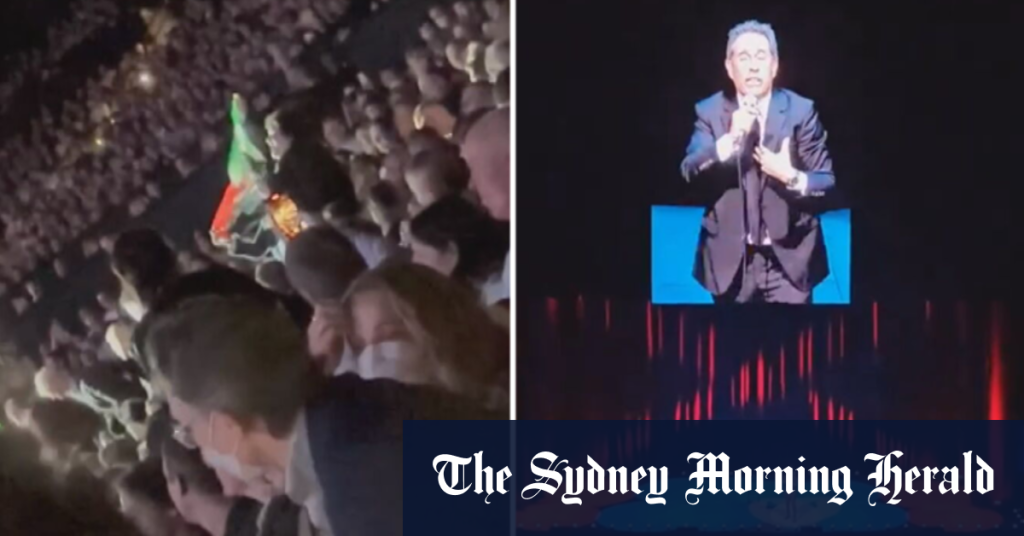Comedian Jerry Seinfeld faced disruptions from anti-war protesters during a recent performance in Sydney, Australia. This is not the first time the comedian has been targeted by protestors, as a similar incident occurred during a show in Melbourne earlier this year. The interruptions reportedly occurred during Seinfeld’s stand-up routine, with protestors shouting “Seinfeld, it’s not funny!” and holding up signs condemning his views on war. Despite the disruptions, Seinfeld continued with his performance and tried to ignore the protesters, who were eventually removed by security.
The protests against Seinfeld appear to be linked to his previous comments about war and violence, which have sparked controversy and criticism from certain groups. These incidents highlight the challenges that public figures like Seinfeld face when expressing their views on contentious issues such as war. While everyone is entitled to their opinion, the protests suggest that some individuals may take issue with Seinfeld’s perspective on these topics and feel the need to express their dissent in a public forum. However, it is important to note that freedom of speech is a fundamental right, and individuals should be able to express their opinions without fear of harassment or intimidation.
The disruptions at Seinfeld’s show raise questions about the role of comedy in addressing serious and divisive issues such as war. Comedy has historically served as a platform for social commentary and criticism, allowing comedians to tackle difficult subjects in a lighthearted and engaging manner. However, the protests against Seinfeld suggest that not everyone may appreciate or agree with his approach to discussing controversial topics. While comedy can provide a valuable outlet for discussing important issues, it is crucial for comedians to be mindful of the impact their words may have on audiences and to be prepared for potential backlash.
Despite the disruptions, Seinfeld’s response to the protests was largely positive and professional. The comedian remained composed and continued with his performance, opting not to engage with the protestors or escalate the situation further. This approach reflects Seinfeld’s experience and professionalism as a seasoned performer, as he was able to navigate the challenging situation with grace and poise. By staying focused on his act and not allowing the protests to derail his show, Seinfeld demonstrated his commitment to his craft and his dedication to providing an entertaining experience for his audience.
The protests at Seinfeld’s show also shed light on the broader issue of activism and the ways in which individuals choose to voice their dissent. While protests can be a powerful tool for raising awareness and effecting change, it is important for activists to consider the impact of their actions on others, including performers like Seinfeld who may become unintended targets. By disrupting Seinfeld’s show, the protestors may have inadvertently alienated potential allies and detracted from the message they were trying to convey. Moving forward, activists may benefit from exploring alternative methods of advocacy that are more constructive and engaging, allowing for open dialogue and discussion on important issues.
In conclusion, the protests against Jerry Seinfeld at a recent show in Sydney highlight the complexities and challenges of expressing dissent in a public forum. While everyone has the right to their opinion, it is important to consider the impact of one’s actions on others and to engage in meaningful dialogue rather than resorting to disruptive tactics. By remaining composed and focused on his performance, Seinfeld demonstrated his professionalism and commitment to his craft, despite facing interruptions from protestors. Moving forward, it is essential for activists and performers alike to approach contentious issues with sensitivity and respect, fostering a culture of open communication and dialogue that promotes understanding and collaboration.


